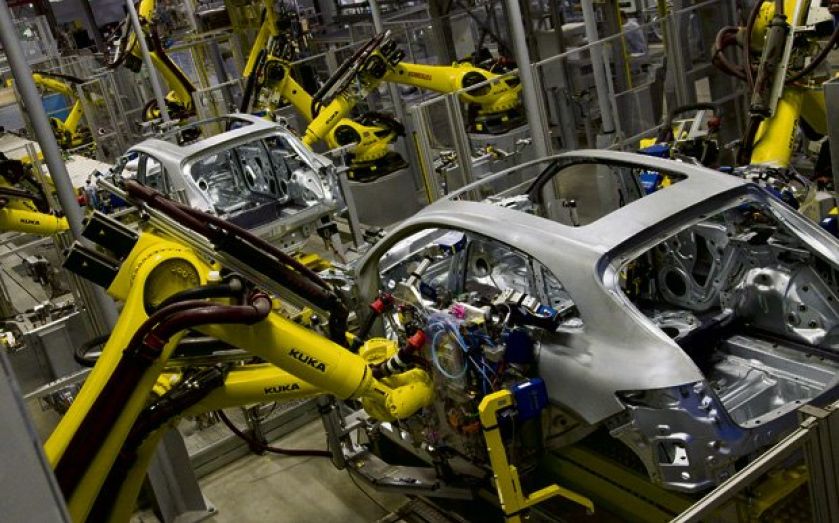| Updated:
Investment Comment: European earnings could be set to come back with a bang

There is a question mark looming over European equities – when will companies deliver on earnings? So far, underwhelming earnings growth has done little to support the market’s upward march. In our view, that is poised to change.
The Eurozone has a real and sustainable economic recovery underway, following four consecutive quarters of positive real GDP growth. But it’s important for investors to remember that absolute levels of growth aren’t as important as improvement in sentiment and expectation toward higher GDP.
A BRIGHTER OUTLOOK
Much of the weakness in the Eurozone observed at the aggregate level has been in part due to aggressive austerity and declines in government spending. Moving into the future, less fiscal drag should support growth. Meanwhile, improving consumer confidence should encourage households to spend less on reducing debt levels and more on consumption, helping corporate revenues.
Profit margins are on the rise, and will be an important driver of earnings. Nominal growth has been dampened, particularly in the periphery, by inflation trending lower. And export-oriented European companies have suffered from the emerging market slowdown and a stronger euro. But both of these drags have moderated. Further, if companies are able to control costs as nominal growth accelerates, profit margins should rise, bolstering earnings growth.
The better economic data, acceleration in nominal growth, and changes in consumer behaviour set the stage for stronger earnings growth. And continued low interest rates and loose monetary policy will also act as a tailwind for improving profits and earnings.
Taken together, this backdrop should contribute to an environment where company fundamentals are more important in determining equity valuations than they have been in the wake of the Eurozone crisis.
GOOD NEWS FOR MARKETS
What does this mean in terms of the investment opportunity? With fundamentals coming back into focus, the market will pay more attention to factors like quality, value and momentum when rewarding individual companies.
For example, this is very much the case in the European automotive sector, where we are overweight in stocks such as BMW and auto parts supplier and tyre manufacturer Continental. Car demand has recovered earlier and faster than analyst expectations (sales rates have come in at almost double the expected rates), creating positive surprises. The average age of a European car is now 8.7 years – the highest it has ever been.
This is incentivising consumers to take a close look at financing options for new car purchases, rather than continuing to service old vehicles. Meanwhile, automotive companies have massively increased their balance sheet strength since the financial crisis, boding well for sustainable growth and the capacity for business investment. The sector is still trading at relatively attractive valuations.
Taking a closer look at BMW, it has benefited from a revitalised product portfolio this year, with new design launches in Europe and China. It also has one of the strongest, if not the strongest, electric car offerings, which should drive a material boost to company growth. These strengths, combined with a cheap valuation and a sound balance sheet, comprise the ingredients we think are necessary for earnings upgrades that will be positive for the stock price.
CORPORATE CONSOLIDATION
Another theme we’re playing is consolidation, which is evident in stocks like Orange SA. In the tough economic conditions following the financial crisis, Europe has seen a transformation within certain industries, with weak players being overtaken through consolidation. In the French telecom industry, for example, the big five players have been reduced to four, and there is potential for further consolidation under the encouragement of the French business minister, who is calling for greater efficiency. This development has benefited Orange SA.
Seeking relative value is a key part of our investment process, and contract catering company Elior is an interesting example. The company serves a wide variety of businesses, carrying out support service functions and operating in the travel food and beverage sector. Given the strength of the business and its growth prospects, we think it is trading on a cheap valuation to peers, yet it delivers a high return on invested capital.
NICHE OPPORTUNITIES
Grifols is an example of a company operating in the medical equipment space that has shown potential to deliver earnings surprises. It is a Spanish firm that makes synthetic blood products and testing equipment materials for blood screening. It has delivered double-digit earnings upgrades due to strong demand for its blood plasma products. In the second quarter, it acquired a diagnostics business from Novartis that was earnings-accretive. The company also won a contract with the Japanese Red Cross recently to supply testing equipment, and it is putting a strong balance sheet to work on other value-accretive acquisitions.
Another interesting theme is represented in the Norwegian stock Hexagon Composites ASA, a global market leader in lightweight composite cylinders for transporting natural gas. It is strongly positioned in the growth market for gas-powered vehicles in the US, and we think the market has overlooked the company’s potential.
We’re also finding interesting opportunities among European housebuilders. For example, the housing market in Stockholm is actually very similar to London in the sense that it suffers from a lack of supply, coupled with demographic and structural factors that push up home values. We like Swedish housebuilder JM Group, a stock that is benefitting from rural migration into cities as people seek jobs and access to the best universities. The stock remains undervalued despite a very strong profits track record.
Blake Crawford is portfolio manager of the JP Morgan Europe Dynamic ex UK Fund, and works in the JP Morgan Asset Management European Equity Group.